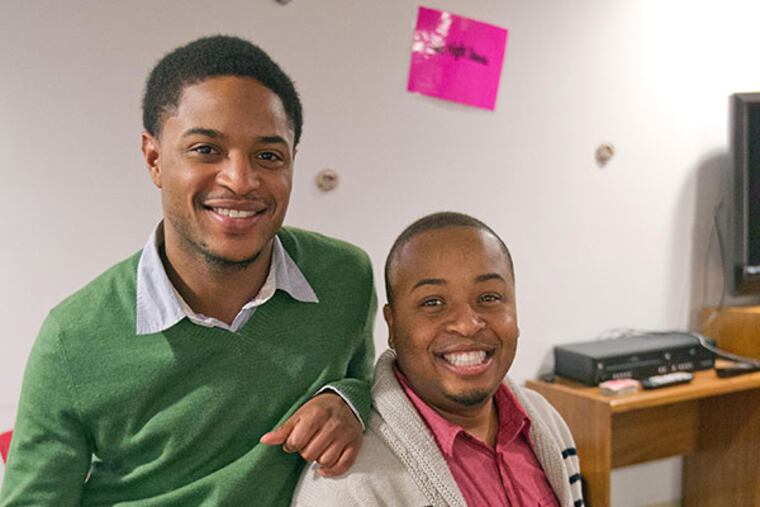Giving hope, help to young gay men
With same-sex marriage on the rise nationwide and celebrities coming out all over the place, one might suppose that young gay men's lives have become "easy, breezy, and free," says Jerome T. Pipes.

With same-sex marriage on the rise nationwide and celebrities coming out all over the place, one might suppose that young gay men's lives have become "easy, breezy, and free," says Jerome T. Pipes.
This seems particularly true when compared with my own youthful emergence from the closet, back in the day when dinosaurs ruled the Earth.
But what if a young gay man coming out in 2014 is African American or Latino and lives in Camden?
Out come the stereotypes - particularly, but not exclusively, among outsiders.
"People think I have parents who aren't married and have 14 different brothers and sisters," said Pipes, who grew up in Camden and lives downtown. "And because I'm gay, I'm promiscuous and have AIDS and will be dying from it soon."
Offering an oasis from attitudes such as those, the Camden Area Health Education Center operates a "drop-in" program for young gay men at 514 Cooper St.
The bright, comfortable basement space is open three evenings a week to males between 17 and 24, and provides HIV testing, counseling, support groups, and social programs.
The New Jersey Department of Health underwrites the $150,000 annual cost of the program, which is seeking to expand by partnering with other community organizations.
On a typical Monday, Wednesday, and Thursday, as many as 20 young men drop by to use the computers, watch movies, or hang out with friends.
"It's about creating a safe place and support for young gay men living in Camden and facing all kinds of challenges and stigmas," said Carol Wolff, AHEC's executive director.
The target population also is at high risk of HIV exposure, substance abuse, and suicide. "That's not to say that every young gay male in Camden is in that situation," Wolff said.
Pipes, 36, and Christian Hill, 22, work at AHEC as health educators, and both attended the drop-in center when they were coming out as gay.
"It was a meeting place where I could be with other gay people," recalled Hill, who grew up in the city and lives in East Camden. "I could be fully myself, and let down my hair and not pretend to be something I'm not.
"Being gay," he said, "is not as accepted as it seems."
Indeed. A gay character on TV is one thing, but a gay son is another, as several center patrons made clear during a recent meeting at AHEC.
"I haven't heard from my father since I told him," a soft-spoken male-to-female transsexual said. "We were at a funeral. And he wouldn't talk to me."
"It's a struggle at home," a young man said.
"I have family members who don't take it well," said another.
Suburban or small-town families typically don't throw a party when a child comes out. But some urban gay youths find themselves cut off from the anchors of family, school, and church.
"Sometimes, for African American or Latino gay youth, the issues are within the community," said Martha Chavis, who works as AHEC's community services manager and lives in the city. "Gays are still not accepted or talked about."
Noting President Obama's evolution from marriage-equality opponent to proponent, Chavis said, "We've got to have a conversation about cultural homophobia in our own community. We need to realize our minority gay youth need to feel a sense of belonging.
"With their higher rates of depression and suicide, it's definitely a public health issue," added Chavis, who has been involved in AIDS prevention work for 30 years.
While Pipes' parents were "always very accepting," some young men at the drop-in center have shared heartbreaking stories.
"One guy's mother told him, 'I hope you die of AIDS,' " Pipes said.
Not everyone who comes through the doors on Cooper Street is suffering, of course. But realizing one is homosexual can be profoundly isolating, even in an age of glamorous role models and hookup apps.
"Being gay is not just about sex. Guys need a safe place just to socialize," Pipes said, noting that the center sponsors field trips to local gay bowling and skating nights.
"When they come here," Christian said, "they can be comfortable in the skin they were born in."